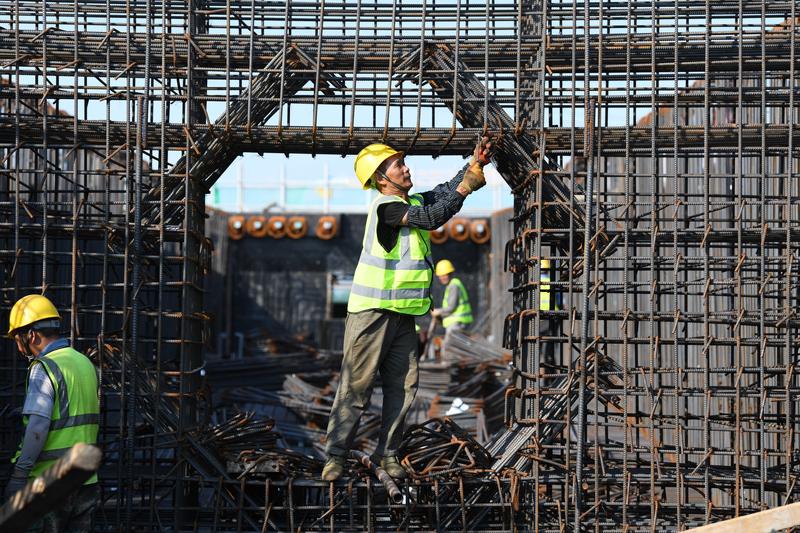Green light for the NDRC plan shows government resolve to stabilize growth
 Workers at a construction site of the high-speed railway linking Hefei in Anhui province to Xinyi in Jiangsu province. (LIU YUNXI / XINHUA)
Workers at a construction site of the high-speed railway linking Hefei in Anhui province to Xinyi in Jiangsu province. (LIU YUNXI / XINHUA)
The State Council, China's Cabinet, has approved a plan to implement relief work programs on major projects to help people find jobs close to home and boost incomes.
Experts said the new plan showcases the government's firm determination to stabilize growth amid downward pressure.
Policy stimulus, notably infrastructure investment, will play a crucial role in boosting domestic demand and driving economic recovery in the second half of the year, they said.
The plan, proposed by the National Development and Reform Commission, said the implementation of relief work programs for major projects will mark a key move to boost effective investment, stabilize employment, ensure basic living needs, spur consumption in counties and stabilize the overall economy.
The plan urges all regions and departments to implement key government-invested projects through employment-for-grant programs as much as possible, with a key focus on fields like transportation, water conservation, energy, agriculture, rural affairs, urban construction, ecology, environment and recovery and rebuilding from disasters.
Zhou Maohua, an analyst at China Everbright Bank, said the plan will help boost effective investment, stabilize employment, increase people's incomes, support a recovery in domestic demand and add momentum to future economic development.
As China's economy is on track to recovery, the government needs to continue to step up fiscal, monetary and industrial policy support, especially for hard-hit sectors and enterprises, micro and small business, manufacturing and the green economy, Zhou said.
Luo Zhiheng, chief economist at Yuekai Securities, said downward pressure still exists in the economy despite the gradual recovery from recent COVID-19 shocks.
He said China still faces pressures from shrinking demand, supply shocks and weakening expectations, which calls for more efforts to step up cross-cyclical and countercyclical policy adjustments.
Referring to the new plan, Luo said launching relief work programs for government-invested key projects will give full play to the crucial role of infrastructure investment in expanding effective investment and stabilizing growth.
"That will provide jobs, especially for migrant workers and those recently lifted out of poverty, and thus help boost consumption, stabilize employment and ensure basic living needs," he said.
Data from the Ministry of Transport showed that as of the end of May, China's highways and ordinary national and provincial highways that will span 87,000 kilometers were under construction by way of more than 2,000 projects.
Considering recently released incremental policies, investment in infrastructure will likely maintain a relatively high growth rate in the second half of the year, and the full-year infrastructure investment may expand by 10 percent year-on-year, Luo said.
Looking ahead, with the better containment of the COVID-19 pandemic and the gradual resumption of work and production, China's economy is set to be back on track with a gradual pickup in demand, smooth supplies and stable expectations, Luo said.
To further prop up the growth, it would be advisable to issue special treasury bonds and allocate the 2023 quota for local government special bonds in advance, Luo said.
Chen Chuanglian, deputy director of the Southern China Institute of Finance at Jinan University in Guangzhou, Guangdong province, spoke highly of the government's recent moves to speed up infrastructure construction, saying such moves will help stabilize growth this year.
On Tuesday, the NDRC released a new plan to expand its national road network to around 461,000 kilometers.
Experts said construction of the national road network will also play a key role in stabilizing investment and economic growth as well as boosting connectivity between China and other markets along the Belt and Road.
Yang Jinghao, chief economist at Concat Data Technology (Hangzhou) Co Ltd, said China will build new expressways stretching at least 30,000 km before 2035, which will help support stimulus-driven economic growth in the future.
ouyangshijia@chinadaily.com.cn


